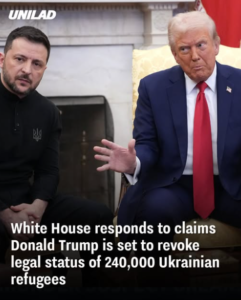Recent reports have surfaced suggesting that the Trump administration plans to revoke the temporary legal status of approximately 240,000 Ukrainian refugees who sought asylum in the United States following Russia’s invasion of Ukraine.
This move could potentially lead to expedited deportations starting as early as April.
In response to these allegations, White House Press Secretary Karoline Leavitt addressed the claims on social media, labeling them as “fake news.” She emphasized that no decision has been finalized regarding the status of Ukrainian refugees, stating, “This is more fake news from Reuters based on anonymous sources who have no idea what they are talking about. The truth: no decision has been made at this time.”
The initial reports indicated that this policy shift is part of a broader initiative by the Trump administration to dismantle humanitarian parole programs established during the Biden era. These programs had provided temporary legal status to over 1.8 million migrants from various countries, including Cuba, Haiti, Nicaragua, and Venezuela. The revocation of such statuses could result in swift deportations for those affected.
The timing of these reports coincides with recent diplomatic tensions between the U.S. and Ukraine. A meeting between President Trump and Ukrainian President Volodymyr Zelenskyy reportedly ended contentiously, leading to a suspension of U.S. military aid and intelligence-sharing with Ukraine.
However, it’s important to note that sources suggest the consideration to revoke the legal status of Ukrainian refugees predates this meeting.
The potential revocation of legal status has raised concerns among immigration advocates and the affected communities. Many of these refugees fled conflict zones, seeking safety and stability in the U.S. The uncertainty surrounding their legal status adds to their vulnerability and anxiety about the future.
While the White House has denied the accuracy of these reports, the situation remains fluid. The administration’s final decision will significantly impact not only the lives of the Ukrainian refugees but also the broader U.S. immigration policy landscape. Observers and stakeholders are advised to monitor official channels for updates on this developing issue.


